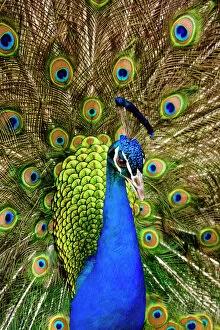Peacock and Nightingale
- By Robert finch
Look at the eyes look from my tail!
What other eyes could look so well?
A peacock asks a nightingale.
And how my feathers twist the sun!
Confess that no one, no, no one
Has ever seen such colour spun.
Who would not fall in ecstasy
Before the gemmed enamelry
Of ruby-topaz-sapphire me?
When my proud tail parades its fan,
You, little bird, are merely an
Anachronism in its van.
Let me advise that you be wise,
Avoid the vision of my eyes.
And then the nightingale replies.
---------------------------------------------------------
Summary:
Look at the eyes look from my tail!
What other eyes could look so well?
A peacock asks a nightingale.
At the outset of the poem a peacock expresses its vanity towards a nightingale by praising its own tail and eyes. And asks a rhetorical question ‘What other eyes could look so well?’. The peacock is extremely proud to say that no other thing in this world is as pretty and attractive as its tail and eyes.
And how my feathers
twist the sun!
Confess that no one, no, no one
Has ever seen such colour spun.
The peacock again asserts the fact that he is the most beautiful sight and a point of attraction. It can strikingly spread out its feathers. Even the sun feels jealous as he twists and turns its spectrum.
The peacock states that he can do wonder with his fascinating feathers. The sun rays intensify its charm or he even surpasses the sun in its beauty. Nothing in the world can produce Such a magical colour combination.
Who would not fall in
ecstasy
Before the gemmed enamelry
Of ruby-topaz-sapphire me?
The peacock affirms that it can captivate others as he in fact is the sight of ecstasy. His body consists of different rare precious stones like Ruby, topaz and sapphire.
When my proud tail
parades its fan,
You, little bird, are merely an
Anachronism in its van.
Here, the peacock degrades the nightingale by saying that when the peacock spreads out its proud feathers like a fan, the nightingale would become insignificant. These lines evoke the nature of superiority as the peacock is comparatively huge in size and its eminence leads to dominate the poor little bird nightingale, even though it has an exceptional skill to sing.
Let me advise that you
be wise,
Avoid the vision of my eyes.
And then the nightingale replies.
In the concluding stanza, the peacock advises the nightingale to be wise and to avoid encounter with the peacock. Or peacock suggests that it is better to keep away from him. But the poem ends enigmatically when the nightingale begins to speak. However, the readers are not able to hear the nightingale’s reply. It may imply that it’s voice may be suppressed miserably.
Critical analysis:
This poem is highly symbolic in the sense that it has a clear political overtone. At a glance it seems to be an imaginary conversation between two birds. Remarkably one is superior and another one is inferior. The size and the abilities also a matter of discussion.
The size of peacock is comparatively superior and it has the power and authority. whereas, the nightingale belongs to the minority group as it is small and weak. Nightingale’s reply is silenced here. May be it represents the predicaments of the marginalized.
The poem 'Peacock and Nightingale' is an allegory as the Peacock represents the privileged or the elites. Whereas the Nightingale represents the marginalized or all the voiceless people.
The sense of colonial superiority also reflects in this poem. Peacock is the symbol of the coloniser (whites) and nightingale is the symbol of the colonised (blacks) or the subaltern. They can’t even speak out or produce a single sound. Their voice remains as unrecorded or deliberately ignored.
This rejected or unrecorded voice may represent the lack of proper history of the marginalized sections. Everything is in the hands of those who are in power. They decide the fate of others. Thus, the poem clearly marks the helplessness or the passive nature of the weaker sections in the society. The silence of the Nightingale powerfully sums up the central idea of the poem.

Thank you so much sir.
ReplyDeleteReally helpful